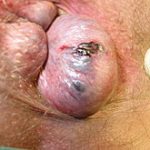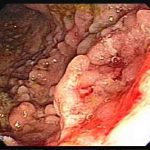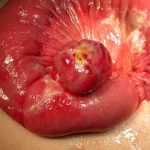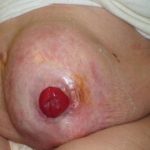Important Aspect of Lower G.I. (Colorectal) Diseases And Its Treatments
The digestive tract or the Gastrointestinal (GI) tract comprises of several organs that help with the intake of food, the absorption of nutrients from it and remove the waste from the body.
 The human gut comprises of upper part and a lower part. The lower part consists of most of the small intestine, all of the large intestine, rectum and anus. There can be a number of diseases affecting this lower part, both in innocuous way and in overt way. The trivial symptoms like weakness, weight loss, occasional bleeding with stool are many times ignored resulting in delayed diagnosis and treatment. There may or may not be familial or inherited trait toward developing bowel cancer. Many of these, if diagnosed and treated at an early stage, can be completely cured.
The human gut comprises of upper part and a lower part. The lower part consists of most of the small intestine, all of the large intestine, rectum and anus. There can be a number of diseases affecting this lower part, both in innocuous way and in overt way. The trivial symptoms like weakness, weight loss, occasional bleeding with stool are many times ignored resulting in delayed diagnosis and treatment. There may or may not be familial or inherited trait toward developing bowel cancer. Many of these, if diagnosed and treated at an early stage, can be completely cured.
Following are the few GI diseases –
- Colorectal cancer and benign pathologies
 These cancers can be very silent to start with and may not be detected without careful attention on part of the patients and the doctors together. To make the matter worse, they can spread from one place to another rather quickly. There lies the importance of early screening and thorough check up. Generaly early diagnosis and intervention can provide complete cure from these cancers and a normal life.
These cancers can be very silent to start with and may not be detected without careful attention on part of the patients and the doctors together. To make the matter worse, they can spread from one place to another rather quickly. There lies the importance of early screening and thorough check up. Generaly early diagnosis and intervention can provide complete cure from these cancers and a normal life.
- Benign anorectal pathologies
 Anal fissure, fistula or haemorrhoids (piles) can have severe implication on quality of life. They may be early signs of more sinister pathologies like cancer as well. Proper vigilance and timely treatment can cure most of them and ensure return to a healthy normal life.
Anal fissure, fistula or haemorrhoids (piles) can have severe implication on quality of life. They may be early signs of more sinister pathologies like cancer as well. Proper vigilance and timely treatment can cure most of them and ensure return to a healthy normal life.
- Inflammatory bowel disease, e.g. Crohn’s disease, ulcerative colitis
 This can be a debilitating condition affecting quality of life. It may affect other systems of the body and may even lead to cancer eventually. Combination of medicine and surgery is the only key to treat this problem.
This can be a debilitating condition affecting quality of life. It may affect other systems of the body and may even lead to cancer eventually. Combination of medicine and surgery is the only key to treat this problem.
- Pre-malignant bowel pathologies like polyps or polyposis syndrome
 While most of the polyps are benign, yet some of them may turn out to be malignant and it is difficult to know which one will. That makes regular check up more important to allow early detection and intervention for those cancerous polyps leading to complete cure.
While most of the polyps are benign, yet some of them may turn out to be malignant and it is difficult to know which one will. That makes regular check up more important to allow early detection and intervention for those cancerous polyps leading to complete cure.
- Small intestinal pathologies like GIST (Gastrointestinal Stromal Tumour)
 These tumours can produce non-specific symptoms or bowel obstruction. They are amenable to combined medical and surgical management which can ensure good result.
These tumours can produce non-specific symptoms or bowel obstruction. They are amenable to combined medical and surgical management which can ensure good result.
- Stoma care including management of stoma-related hernias
 Many a times people have to live with a stoma after operation. While most of these people live a perfectly normal life, sometimes these can be complicated with hernia. Timely repair can restore body image and avoid further complications like obstruction, necrosis.
Many a times people have to live with a stoma after operation. While most of these people live a perfectly normal life, sometimes these can be complicated with hernia. Timely repair can restore body image and avoid further complications like obstruction, necrosis.
The Lower G.I. division of ILS Hospitals comprises of a group of highly trained doctors and paramedical personnel. The medical group consists of surgeons, gastroenterologists, oncologists, radiologists and pathologists. The paramedical group has the specialist nurse, stoma care provider and nutritionists. The department has state of the art operating theatre, endoscopy suites and equipment for most modern modes of colorectal and anorectal bowel problems.
Most of the operations are done here by laparoscopic or key-hole surgery, and also by SILS (single incision laparoscopic surgery) or TEMS (Trans-anal Endoscopic Microsurgery). This has been the trend over the last decade which gets people back to their normal life significantly quicker than the conventional surgery.
So, in case you are suffering from any colorectal condition and are looking for some extensive treatment then come at ILS Hospitals now in order to get the best, advanced treatment under the guidance of our eminent doctors.
 Dr Atindriya Biswas, a renowned laparoscopic colorectal surgeon lends his hands to support and realize this vision to establish and run colorectal service at ILS Hospitals. Dr. Biswas has been extensively trained in India and UK. He has been a surgical consultant in UK centers and some of the apex Indian institutes like Apollo Gleneagles Hospital and Tata Medical Center. He performs most of the procedures by laparoscopy or endoscopy.
Dr Atindriya Biswas, a renowned laparoscopic colorectal surgeon lends his hands to support and realize this vision to establish and run colorectal service at ILS Hospitals. Dr. Biswas has been extensively trained in India and UK. He has been a surgical consultant in UK centers and some of the apex Indian institutes like Apollo Gleneagles Hospital and Tata Medical Center. He performs most of the procedures by laparoscopy or endoscopy.
Call: ILS Hospitals Salt Lake: 033-40206500 | Dumdum: 033-40315000
4 Common Gastrointestinal Diseases That You Should Be Aware Of
We all come across articles with catchy titles like ‘best food for weight loss’, ‘worst food during pregnancy’, and so on, isn’t it! Indeed the food we eat determines many health factors for us. However, sometimes the passage of food, the digestive tract, itself gets inflicted with many diseases. In fact, the number of gastrointestinal conditions is on a rise since the past few decades. Let’s take a look at some of the most common ones of them.
Gastrointestinal conditions are the diseases that originate in any or more of the organs of the GI tract and its accessory organs. It includes the esophagus, stomach, gallbladder, liver, pancreas small and large intestine, colon and rectum. A good Gastroenterologist can offer extensive treatment of the same.
Some of the most common GI conditions are as follows.
1. GERD (Gastroesophageal reflux disease)
Acidity, reflux and heartburn are some most commonly experienced symptoms related to digestion. GERD is the severe form of such acid reflux. It is characteristic by regular acid reflux, often with a sour or bitter taste in the mouth. GERD might be a result of underlying hiatal hernia (for which hernia treatment must be sought immediately) and moreover, untreated GERD can severely harm the esophagus, so it is advised to address it on time.
2. Gallstones
Gallstones is yet another most common GI condition. Gallstones are solidified, crystalline substance that occurs inside the gallbladder. Its size may vary from small granular to big golf ball sized. It causes tremendous pain and can be eased with medicines. However, it is crucial to note that gallstones are mostly impossible to cure with medicine, and it can only be treated permanently with gallstone operation.
3. Gastroenteritis
This is a pathogen infection of the GI tract, which can include, bacteria, virus and parasites. It brings multiple symptoms at once, such as vomiting, diarrhea, headache and also fever. Usually, it is known as common stomach flu. The mild flu can be managed easily with adequate rest, plenty of water and minerals and mild over-the-counter drugs. But it might need some medical treatment, if the symptoms persist for long, or if it triggers again and again. However, these are easily spread and measures should be taken to avoid the possibility.
4. Peptic Ulcers
Unhealthy diet, lifestyle and excessive use of certain medicines can deteriorate the inner membrane of the stomach and expose it to the digestive acids. This results in ulcers and causes several digestive complications, if left unresolved. It often cannot resolve on its own, as the ulcers stay exposed to the enzymes persistently. Thus, its timely treatment is quite important and so is making certain changes in the diet and lifestyle.
There are several other GI conditions as well which need to be treated effectively. At ILS Hospitals, we offer extensive diagnosis treatment for a wide range of GI conditions.











